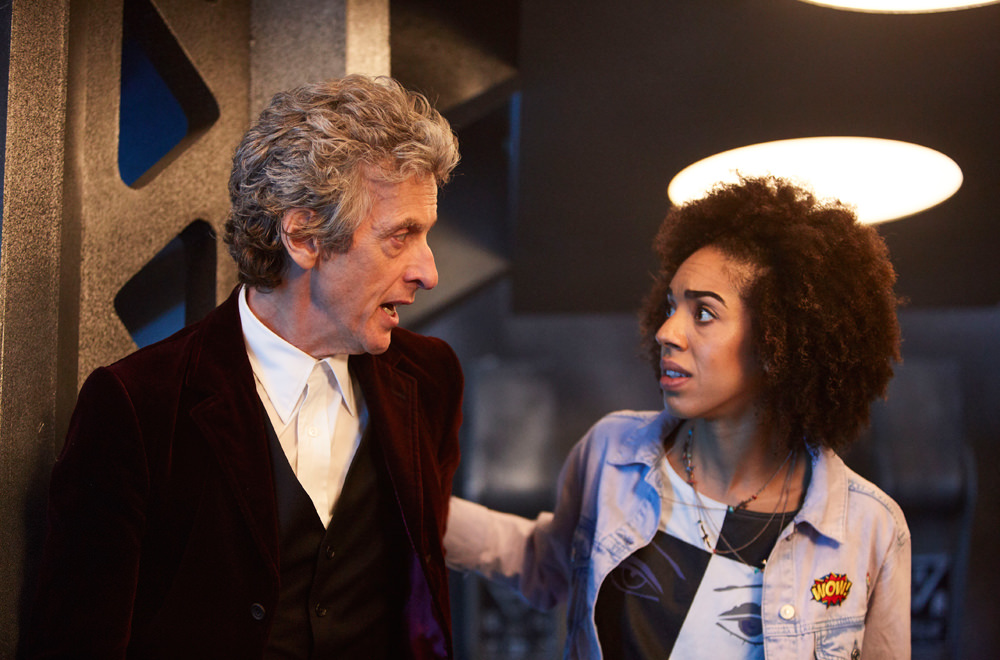In modern Doctor Who, the introduction of a new companion has become as important an event as the introduction of a new iteration of the Doctor. Call it the Rose Tyler effect. Like it or not, pretty much every main companion introduced since her has had to sort of … contend with her in some way. Because of Rose, in modern Who, a new companion has to:
Serve as the perfect entry point character for the audience.
Serve as a perfect foil or counterpoint for whatever iteration of the Doctor invites her aboard the TARDIS.
Be heroic in her own right.
Have a backstory worth exploring.
Inject romantic undertones to an adventure story, either by developing feelings for the largely asexual lead character or by having a romance with a side character.
Be adventurous, curious, plucky, highly intelligent (in a sometimes native, unschooled way), and admirably self-confident (or even more admirably able to fake it).
That was Rose. That was also, not coincidentally, Martha, Donna, Amy, and Clara. And with the introduction of each new spin on this type of companion, the stakes have gotten higher each time to make her ever more fascinating, ever more admirable, ever more plucky. In fact, the introduction of a new companion now has to hit so many marks and check off so many boxes, while at the same time making the audience believe they’re seeing something fresh, that it’s become far more complicated than the introduction of a new Doctor.
Steven Moffat, now presiding over his final season as show runner, with a Doctor also exiting at the same time, is in an interesting position with this introduction. And to his credit, he made a really interesting choice. There’s not necessarily any good reason to think a companion introduced now will last past this one season, which may have been one of the reasons why Moffat felt free to go a little left-field with this character. Now, you may be thinking “Isn’t Bill a good entry point character, a good foil for this Doctor, intelligent but unschooled, curious and plucky? Isn’t she pretty much exactly the same as most companions in the modern era?” Yes and no. Or rather, “Yes and yes, but…”
What’s most interesting about Bill isn’t the ways in which she checks off the same or similar boxes as so many other companions in the last decade. It’s the other boxes she checks off; the boxes that Steven Moffat tended to deliberately not check off when it came time to develop his companions. Amy and Clara were pretty, perky 20-something white girls who were interesting only because the viewer was literally informed of such when they were introduced. In other words, neither of them were particularly interesting people on the surface, but we were told they were fascinating because they were caught up in some sort of fantastical and excruciatingly unknowable mystery. Whatever backstories or home lives they had were barely touched upon so as to keep them as clean a slate as possible. This all felt in many ways like a rebuke to the companions of his predecessor showrunner Russell T Davies, who tended to be given messy home lives and over-bearing parents or love interests, and who tended to be formed by their class, employment situations and life decisions as much as by their family histories. Davies wrote companions who lived firmly in the England of their time. Moffat wrote lost girls and princesses who could have walked out of fairy tales.
Neither approach was wrong. And we certainly aren’t trying to disparage Amy and Clara, who both turned out to be highly memorable characters whose exits from the show were dramatic tear-jerkers. But it could easily be said that Moffat has been running out of steam for a while now, and that Clara especially was oversold as a character and too similar to Amy in a lot of ways. This is why Bill is such a breath of fresh air. She’s everything the show needs right now.
First and foremost, she knows herself and seems pretty damn okay with the deal. This is not a small thing in a universe where companions have been pitched as living mysteries for a good while now. Gone are the pretty, perky impossible girls, to be replaced with a funny, wry, inquisitive and highly practical type; something the show hasn’t truly seen in a companion since the days of Donna Noble. Second, she’s really likable. Not in a bright, perky, rapid-speaking way (as Moffat companions tend to be), but in an empathetic, knowing way. You get the impression she’s dying to experience more out of life, but that what little she has experienced has made some deep impressions on her.
Third, she’s highly intelligent, but uniquely so, which becomes obvious when she brings up the improbable naming of the TARDIS or immediately questions how it got in his office or how it got on top of the rug she gave him. It’s implied that the Doctor (who has gotten sentimental enough in his old age to have pictures of his granddaughter and his wife on his desk) sees something of Susan in her, which is a nice touch. But her introduction also shows the limits of her intelligence, in a sequence that may have come across a little mean-spirited but to us represented the uniqueness of her mind. It took her much longer than the usual companion to figure out that the TARDIS was not only bigger on the inside, but capable of much more than it appeared to be. But her first thought – that he had knocked through the wall of his office and they were merely in another room in the building – made absolute perfect sense, as did her assumption that it was a large elevator when it deposited them in the basement. Her observation that it looked like a high-tech kitchen rather than a spaceship coupled with her immediate recognition that he was about to attempt to wipe her memories shows just how broad and incisive her thinking is, while still being rooted in the practicality of the real world. Nothing could sum her up better than her response to the reveal that the TARDIS is much more than she thought possible. The Doctor asks the increasingly distraught girl how she’s doing and she spits out an exasperated “How do you think?!?” To the ever-practical Bill, there’s only one answer to that question, making it a stupid question.
In fact, when you take all her qualities in total, you realize not only how different she is from the usual Moffat companion, but how much she’s like a typical Russell T Davies in companion. Taken further, a black, queer, working class companion with a funny, practical streak and an unsatisfying home life is literally every single one of the Davies companions (Rose, Martha, Captain Jack, Donna) combined into one person. We doubt very much these choices were deliberate, but it’s striking how much Moffat appears to be referencing the tone of the show prior to his time at its head. She’s not living in a fairy tale mystery, she’s working the chips fryer and dreaming of something better. It’s perfect. She’s perfect.
As for the Doctor himself, Moffat flipped the script and made him the mystery that needs to be figured out. Why has he literally parked his TARDIS at university and spent the last half-century-plus rooted to the spot and teaching classes? Everything we know about the character indicated he’d never do something like this without excellent reasons, and of course the mystery of the vault will certainly be lingering over the rest of the season. The episode itself was a fairly basic but fun adventure in the classic Who mode (complete with a visit to the local quarry/alien planet). This didn’t, in retrospect, have the high-energy, hit-the-ground-running quality of many of Moffat’s season openers, although we don’t get the impression that the show is moping along. Instead, it feels fairly quietly confident in itself, which is another welcome change. As always, we never know where the show’s going to go, but Moffat surprised us in ways and on fronts we didn’t think him capable of with this episode.
Practically Everything Bonnie Wore on “Big Little Lies” With Our Scattered Thoughts About What it All Meant Next Post:
Zosia Mamet is Awash in Ruffles at the IWC Schaffhausen Tribeca Film Festival Party
Please review our Community Guidelines before posting a comment. Thank you!




